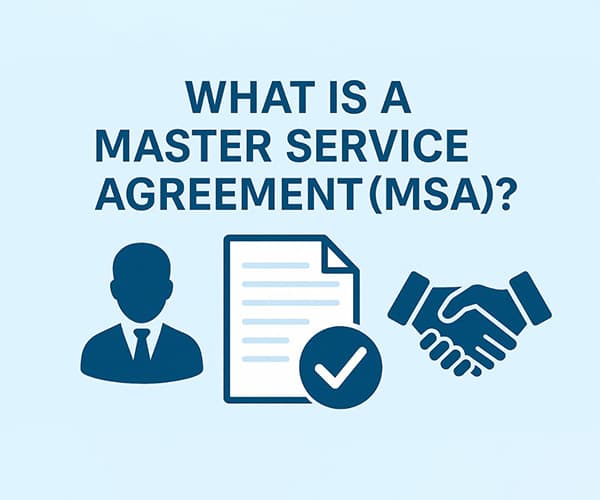What is a Master Service Agreement (MSA)? Complete Legal Guide

In today’s business world, companies often enter into multiple contracts with service providers, vendors, or clients. Instead of negotiating new terms for every transaction, they use a single umbrella contract called a Master Service Agreement (MSA). But what is a Master Service Agreement in India, why is it important, and what clauses must it include? This guide by Vakeel Saab explains the Master Service Agreement format in India, its key components, and legal safeguards.
A Master Service Agreement (MSA) is a legal contract between two parties that establishes the framework for future transactions or projects. It defines general terms such as payment, liability, confidentiality, and dispute resolution, while specific project details are set out in separate documents like Statements of Work (SOWs). This blog provides a Master Service Agreement legal guide, covering clauses, format, differences from SOWs and SLAs, and why businesses should consult Corporate Lawyers in India before signing an MSA.
What is a Master Service Agreement in India?
A Master Service Agreement is a comprehensive contract that governs the general relationship between a service provider and a client. It is widely used in IT, outsourcing, consultancy, and corporate services.
- Scope: Covers long-term business engagements.
- Flexibility: Allows adding project-specific SOWs later.
- Risk Management: Allocates responsibilities, liabilities, and dispute resolution mechanisms.
Master Service Agreement vs Statement of Work (SOW)
Businesses often confuse MSAs with Statements of Work. Here’s the difference:
- MSA: Outlines the general framework and legal relationship between the parties.
- SOW: Defines the scope, deliverables, timelines, and costs for a particular project under the MSA.
Think of the MSA as the umbrella agreement, and the SOW as the project-specific contract attached to it.
Key Components of a Master Service Agreement
According to Corporate Lawyers in Delhi, the Master Service Agreement components should always include:
- Parties and Scope: Identification of parties and the services covered.
- Payment Terms: Mode, schedule, and currency of payment.
- Confidentiality Clause: Ensures protection of sensitive business information.
- Liability Clause: Defines limits of liability and indemnification obligations.
- Intellectual Property Rights: Allocation of ownership of IP created during the engagement.
- Termination Clause: Grounds and process for ending the agreement.
- Dispute Resolution: Arbitration, mediation, or litigation procedures.
Benefits of an MSA for Businesses
Using a Master Service Agreement provides significant advantages:
- Reduces time and cost of repeated contract negotiations
- Provides clarity on legal obligations and risks
- Ensures consistency across multiple projects
- Protects confidential information and intellectual property
- Creates a long-term legal framework for business growth
MSA vs SLA – What’s the Difference?
Many companies also use Service Level Agreements (SLAs). While an MSA defines the legal framework, an SLA specifies performance standards and quality metrics. In short:
- MSA: Legal and commercial terms of relationship.
- SLA: Technical and performance expectations within a project.
How to Draft a Master Service Agreement in India
Drafting an MSA requires expertise in corporate law. Here are best practices:
- Use a standard Master Service Agreement template India but customize for business needs.
- Include all MSA key clauses confidentiality liability India without loopholes.
- Clearly define ownership in MSA intellectual property rights clause.
- Ensure termination and renewal clauses align with business strategy.
- Get the draft vetted through Corporate Lawyer Consultation before execution.
Sample Master Service Agreement (India)
While MSA sample India formats are available online, businesses should avoid generic drafts. Each agreement must be tailored to the company’s services, risks, and jurisdictional requirements. An experienced Corporate Lawyer in India can prepare a watertight agreement protecting your interests.
Frequently Asked Questions (FAQ)
What is a Master Service Agreement?
It is a contract that defines the legal framework for multiple future business transactions between two parties.
What is the difference between MSA and SOW?
An MSA sets overall terms of relationship, while an SOW defines project-specific deliverables, timelines, and costs.
What are key clauses in an MSA?
Confidentiality, liability, intellectual property rights, dispute resolution, and termination are the most important clauses.
Can I use an online MSA template?
Templates can be a starting point, but legal consultation is essential to ensure compliance and protection of business interests.
How can corporate lawyers help with MSAs?
Corporate Lawyers in India draft, review, and negotiate MSAs, ensuring fairness, legal validity, and risk minimization.
Planning to sign a Master Service Agreement? Don’t risk vague or unfair clauses. Vakeel Saab connects you with top Corporate Lawyers in Delhi and across India for expert corporate lawyer consultation. Book your consultation today and get your MSA drafted or reviewed with confidence.
Related Articles
The Importance of Consulting a Property Lawyer for Real Estate Issues
Blog
How to File a POCSO Complaint in India: Step-by-Step Legal Process
Blog
What punishments does the law give for giving, taking, or asking for dowry?
Blog
Reasons for the Increasing Divorce Rates in India
Blog
What is a Special Leave Petition? Meaning, Features, Process & & Who Can File?
Blog
What Is the Difference Between Mutual Divorce and Contested Divorce?
Blog